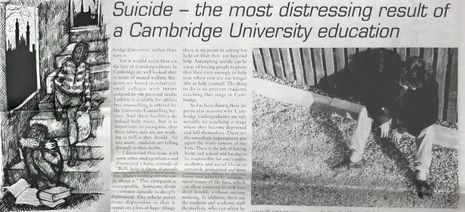Is Cambridge getting better at dealing with mental health?
Isabella Steinmeyer looks into the archives, and asks what has changed since 1989?

“My over-riding memory of Cambridge will be of people sitting in front of gas fires having break-downs”. If you swap the gas fires for electric gyp hobs, this image feels familiar – yet this quote is from a Varsity issue written 35 years ago. The article, which discusses Cambridge’s mental health crisis, states that “Between 1973 and 1988 there were 13 suicides”. Compare that with 2022, when coroners confirmed that five Cambridge students took their own lives. This statistic is alarming, to say the least.
What is most striking about this piece, written in 1989, is the author’s explanation for the high suicide rate at our university. She blames the “intense short terms” for adding unnecessary pressure onto Cantabs and creating a “highly artificial environment”. Sound familiar? Last month, the University declined the proposal for a trial reading week, and instead offered a ‘Review of Teaching’. Many students have complained that this measure feels performative. The university has had since at least 1989 to ‘review’ Cambridge’s excessive workload – how much longer can we expect to wait for decisive change? The Student Union’s recent Workload Forum is promising, but a forum is only a small step in the pursuit of meaningful action.
"How much longer can we expect to wait for decisive change?"
The 1989 article points to the University’s low dropout rate as a cause for the disproportionate number of students taking their own lives at Cambridge. She writes that Cambridge “has the lowest drop-out rate of any university in this country” and speaks of the acute pressure to emerge from personal struggles with a set of well-written essays. This remains a major concern: today, at just 1%, Cambridge has the lowest dropout rate of any Russell Group university. The University has been accused of being resistant to students intermitting, suspicious that students will use the time off to gain an academic advantage. Has Cambridge’s commitment to ‘academic integrity’ come at the expense of its students' mental health? Add to that the pressure from students' families, friends, and from themselves to ‘stick it out’ because they’ve worked so hard to earn a place at this prestigious institution, there’s no wonder Cantabs often find themselves feeling trapped.
The mental health support provision maintains many of the same remedies from the 1980s: personal tutors are still assigned for pastoral needs, there still exists a free University Counselling Service, and Nightline (rebranded from Linkline) continues to offer students advice. Though these services can offer support for students, the mental health crisis is rampant. The 1989 article argues for “more informal contact” between tutors and their tutees, with a “reduced number of students assigned to each tutor”. If the tutor-tutee relationship is supposed to ensure the welfare of students, then a bi-termly, five-minute chat about your plans for the holiday falls short.
"If the tutor-tutee relationship is supposed to ensure the welfare of students, then a bi-termly, five-minute chat about your plans for the holiday falls short"
The article also calls on directors of studies to take on greater responsibility for their students’ mental health. We have more interactions with them than with most other members of staff, and it seems unnatural to separate academic and pastoral responsibilities so bluntly. Workload and wellbeing are inextricably tied; directors of studies should check up on their students’ welfare, not just their essays.
It is standard practice for therapists to adopt a 'no advice' policy with their clients, but this can leave students feeling that University counselling is flawed. It’s always helpful to share (a problem shared is a problem halved), but this inability of counsellors to offer specific guidance means people leave their sessions without answers. A student who used the service described it as an “outlet” rather than a constructive two-sided discussion. Opening up is beneficial, but this approach can feel like you’ve opened up Pandora’s box only to be told you have to fight the problems you’ve unleashed on your own.
But there is reason for optimism. You may have seen the Reach Out posters plastered on the back of loos doors, on Buttery pin boards and even on coasters. Though the cartoons of people hugging their knees, or scratching their heads are borderline creepy, Reach Out’s campaign is admirable. Designed to help students untangle the overlapping and confusing web of welfare services on offer, and ensure they get the help they need, Reach Out’s promise to spend an extra £4.7 million to improve and clarify the welfare provision at Cambridge brings hope.
Cantab culture has also changed since the 1980s. The quote at the beginning of this article is unfinished. In full, it reads: “My over-riding memory of Cambridge will be of people sitting in front of gas fires having break-downs and no-one noticing.” This, along with the article’s complaints that Cambridge students are dismissive of each other’s problems, and avoid people when they’re feeling low, does not describe the Cambridge community I know. Conversations about mental health are increasingly destigmatized (Varsity published at least four articles on this subject in Michaelmas last year) and I believe we are a kinder, more supportive student body.
"We are a kinder, more supportive student body"
Camfess is a testament to this. In the past week, amid posts on ‘Colleges as Barbie movies’ and indignation that Jacob Elordi chose to attend Oxford not Cambridge, there were multiple confessions by people who were struggling with their mental health. The comments sections were touching. As well as providing advice, suggesting societies and listing phone numbers for helplines, many actually offered to chat to those in need themselves. This is a far cry from the “self-obsessed” and cut-throat environment depicted in the 35-year-old article. So, until the University takes decisive action to tackle excessive workloads and clarify the muddled welfare provision, we should be comforted that our fellow Cantabs are willing to lend an ear.
If you are affected by any issues raised in this article then in the UK and Ireland, Samaritans can be contacted on freephone 116 123, or email jo@samaritans.org or jo@samaritans.ie. In the US, you can call or text the National Suicide Prevention Lifeline on 988, chat on 988lifeline.org, or text HOME to 741741 to connect with a crisis counselor. In Australia, the crisis support service Lifeline is 13 11 14. Other international helplines can be found at befrienders.org
 News / Clare Hall spent over £500k opposing busway 24 December 2025
News / Clare Hall spent over £500k opposing busway 24 December 2025 Comment / The ‘class’ of Cambridge24 December 2025
Comment / The ‘class’ of Cambridge24 December 2025 News / Caius mourns its tree-mendous loss23 December 2025
News / Caius mourns its tree-mendous loss23 December 2025 News / Girton JCR publishes open letter expressing solidarity with Palestine25 December 2025
News / Girton JCR publishes open letter expressing solidarity with Palestine25 December 2025 Comment / Yes, I’m brown – but I have more important things to say22 December 2025
Comment / Yes, I’m brown – but I have more important things to say22 December 2025










